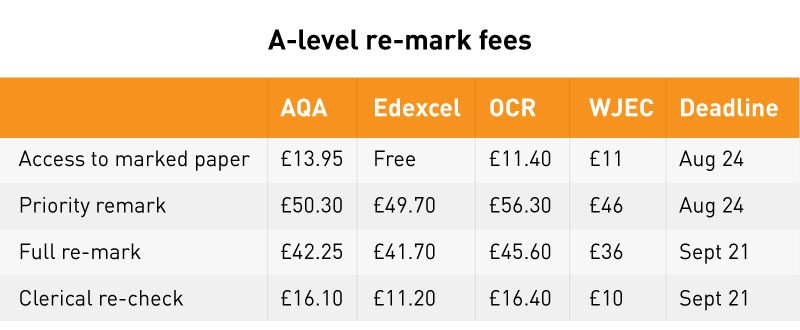Pupils across England will get their A-level results on Thursday, and while most of them celebrate, their exams officers, teachers and school leaders will be deciding what to do about those who haven’t got the results they had been expecting.
Each exam board takes a slightly different approach to the re-marking and appeals process, so we have collated all the latest information on how the system will work this year and how much it will cost to make it easier for schools dealing with unexpected results on the day.
1. How can I get copies of marked exam papers?
 If a grade doesn’t look right and your school wants to check a pupil’s marked exam paper, you can get hold of them from the exam boards.
If a grade doesn’t look right and your school wants to check a pupil’s marked exam paper, you can get hold of them from the exam boards.
This is called “access to scripts”, and is often used by schools when weighing up whether or not to ask for a re-mark.
How you go about doing this and how much it costs depends on the exam board.
For Edexcel exams, all electronically marked papers can be downloaded by schools for free from the Edexcel Online service from Thursday. This is a new system that was announced last year.
The other three exam boards have to release photocopies of marked A-level scripts when asked to do so by schools (or by “private candidates”, like those who are home educated), but they charge a fee.
WJEC charges £11 per paper, OCR £11.40 and AQA £13.95. The deadline to apply to all three for a copy of a paper is August 24, one week after A-level results day.
For pupils whose university place is pending, schools should go straight to a priority re-mark (see point 3), rather than waiting for a marked paper.
2. How do I report missing or incomplete exam results?
All four boards have a slightly different approach to queries about missing or incomplete results.
AQA asks exams officers to call them, and has full details of its procedure here.
OCR has a “missing and incomplete result service”, which is available online here.
Those with enquiries about missing results from WJEC should call the board’s centre support team on 029 2026 5000 or email centres@wjec.co.uk.
Edexcel asks schools whose results are missing or incomplete to call 0844 463 2535 or e-mail examsofficers@pearson.com.
3. How can I request an A-level exam re-mark?
The exam boards call these “enquiries about results”, and they can involve several different approaches, all with different fees (see table). These fees are only generally charged if a review does not result in a change in mark.
Schools can request…
- A clerical re-check: Not a re-mark, but a check on how the marking procedure has been applied to a particular paper. The deadline for these is September 21 and schools can expect a response within 10 calendar days.
- A full re-mark: Referred-to as a “review of marking” by the exam boards, this is a clerical check and a review of all the marks given for a paper. The deadline is September 21 and responses are issued within 20 calendar days.
- A priority re-mark: The same as a full re-mark, but carried out earlier and quicker. The deadline is August 24, and schools get their response within 15 calendar days.
- A review of moderation: If a school isn’t happy with the moderation of internally assessed coursework marks, it can ask for a do-over. The cost can vary significantly depending on the exam board and how many pupils were included in the original sample sent to the board. As a result, we have not included it in our fees table to avoid confusion.
4. How do I appeal an A-level mark?
If a school has been through the re-marking process and still isn’t happy with the result, it can appeal, with fees again varying between exam boards.
The appeal process has two stages: a preliminary process which involves an investigation of the case, and a hearing held by an independent appeals committee.
Schools must complete the preliminary appeal before progressing to the committee stage.
Requests for appeals must be sent to exam boards within 30 calendar days of receiving the outcome of a re-mark, and must clearly set out a school’s grounds for appeal.
The JCQ, which represents the exam boards, has published a guide to this process here.
There are also other elements of the exams system that schools can appeal against.
For example, if a school has reported malpractice and is unhappy with a decision made about the report, it can appeal.
Appeals can also be made against decisions made in regards to access arrangements and special consideration, and against any sanctions imposed on them.



Your thoughts